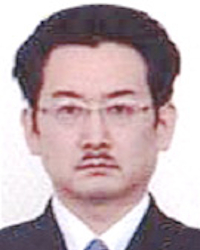Division and Department
Department of Clinical Oncology

Hiroyuki SHIBATA, M.D. & Ph. D.
A Greeting from the Professor
Nearly one-half of men and one-third of women in Japan experience some form of malignant disease during their life-span. In fact, cancer has been the number one cause of death over the last 30 years. Chemotherapy and palliative care are often the only ways to care for patients suffering from advanced cancers. However, the benefits obtained from medicinal treatment are still limited. We must therefore continue making efforts to develop new chemotherapy strategies. These include a better understanding of cancer biology, discovering the molecular targets, and synthesizing new agents. We must improve our knowledge and acquire new treatment skills, which are indeed progressing today without rest. The missions of our department include educating undergraduate and graduate students to become clinical oncologists: physicians who study and treat cancer. Quality patient care is also a mission. We strive to provide the most suitable treatment for patients. As cancer is a systemic disease, treatment of advanced cancer needs a multidisciplinary approach. Akita University Hospital is a highly organized hospital composed of a large number of clinical faculties in clinical and basic studies, which helps us pursue our goal of raising the next generation of researchers and medical providers. Although our department was established very recently – in February, 2009 – we have lofty goals and we are determined to achieve them.
Staff
Professor:
Hiroyuki SHIBATA, M.D. & Ph. D.
Research Areas
- Molecular carcinogenesis of the gastrointestinal tract
- Molecular function of cancer-related genes (such as APC, TP53, MMR genes)
- Molecular diagnosis of cancer or the therapeutic effects of drugs
- Development of new agents (synthetic curcumin analogs)
- Chemoprevention
- Cancer immunotherapy
- Clinical trials
Contact Information
1-1-1 Hondo, Akita, 010-8543, Japan
Phone: +81-18-884-6261/6262
Fax: +81-18-884-6455
E-mail: [email protected](H.S.)
Most Recent Achievements
- TGF-β and Cancer Immunotherapy. T MaruYama, WJ Chen, H Shibata. Biological and Pharmaceutical Bulletin 45 (2), 155-161, 2022
- Two Cases of ALK-Altered Cancers of Unknown Primary Diagnosed by Immunohistochemistry. Y Kato, K Shimazu, K Fukuda, T Yoshida, D Taguchi, H Shinozaki, H Nanjyo, H Shibata. Case Reports in Oncology 15, 21-26, 2022
- Sudden and severe cardiotoxicity induced with pembrolizumab, its clinical course, therapeutic intervention, and outcome. T Matsumoto, K Fukuda, T Yoshida, K Shimazu, D Taguchi, H Shinozaki, K Seki, T Yamanaka, M Ootaka, H Nanjyo, H Watanabe, H Shibata
International Cancer Conference Journal 11 (1), 81-86, 2022 - A novel Lynch syndrome pedigree bearing germ-line MSH2 missense mutation c.1808A>T (Asp603Val). R Sekine, K Shimazu, D Nakano, T Yamaguchi, Y Suzuki, K Fukuda, T Yoshida, D Taguchi, K Iijima, H Nanjyo, H Shibata. Japanese Journal of Clinical Oncology 52 (1), 81-85. 2022
- Curcumin analog GO‐Y030 boosts the efficacy of anti‐PD‐1 cancer immunotherapy.
T MaruYama, S Kobayashi, H Shibata, WJ Chen, Y Owada. Cancer science 112 (12), 4844, 2021 - Phase II study of trifluridine/tipiracil (TAS-102) therapy in elderly patients with colorectal cancer (T-CORE1401): geriatric assessment tools and plasma drug concentrations as possible predictive biomarkers. M Takahashi, Y Sakamoto, H Ohori, Y Tsuji, M Kuroki, S Kato, K Otsuka, K Komine, M Takahashi, S Takahashi, H Shirota, K Ouchi, Y Takahashi, H Imai, H Shibata, T Yoshioka, M Tanaka, H Yamaguchi, T Yamaguchi, H Shimodaira, C Ishioka. Cancer Chemotherapy and Pharmacology 88 (3), 393-402. 2021
- The curcumin analog GO-Y030 controls the generation and stability of regulatory T cells.
T MaruYama, S Kobayashi, H Nakatsukasa, Y Moritoki, D Taguchi, Y Sunagawa, T Morimoto, A Asao, W Jin, Y Owada, N Ishii, Y Iwabuchi, A Yoshimura, WJ Chen, H Shibata. Frontiers in immunology 12, 687669. 2021 - Outcome of colorectal cancer in Diamond–Blackfan syndrome with a ribosomal protein S19 mutation. K Kimura, K Shimazu, T Toki, M Misawa, K Fukuda, T Yoshida, D Taguchi, S Fukuda, K Iijima, N Takahashi, E Ito, H Nanjyo, H Shibata. Clinical Journal of Gastroenterology 13 (6), 1173-1177 3. 2020
- Lung adenocarcinoma in a patient with Li-Fraumeni syndrome bearing a novel germ-line mutation, TP53R333Vfs*12. S Takahashi, K Shimazu, K Kodama, K Fukuda, T Yoshida, D Taguchi, T Takahashi, H Nanjyo, H Shibata. Jpn J Clin Oncol. 50 (10), 1214-1217, 2020
- Therapeutic drug monitoring of regorafenib and its metabolite M5 can predict treatment efficacy and the occurrence of skin toxicities. D Taguchi, M Inoue, K Fukuda, T Yoshida, K Shimazu, K Fujita, H Okuyama, N Matsuhashi, A Tsuji, K Yoshida, M Miura, H Shibata. Int J Clin Oncol . 25 (4), 531-540. 2020
- Clinical benefits of adjuvant chemotherapy with carboplatin and gemcitabine in patients with non-small cell lung cancer: a single-center retrospective study KNYM S Takashima, K Imai, M Atari, T Matsuo, K Nakayama, Y Sato, S Motoyama, H Shibata, K Nomura. Y Minamiya. World Journal of Surgical Oncology volume 18(1):263. 2020
- Phase II trial of induction chemotherapy with carboplatin and paclitaxel plus bevacizumab in patients with stage IIIA to IV nonsquamous non-small cell lung cancer. K Imai, T Nakagawa, I Matsuzaki, K Orino, H Saito, K Sato, M Sano, K Nakayama, Y Sato, S Motoyama, K Nomura , H Shibata, Y Minamiya. Surg Today. 49, 678-685. 2019.
- Dietary intake of pyrolyzed deketene curcumin inhibits gastric carcinogenesis
T Yoshida, T Maruyama, M Miura, M Inoue, K Fukuda, K Shimazu, D Taguchi, H Kanda, M Oshima, Y Iwabuchi, H Shibata. Journal of Functional Foods 50, 192-200, 8, 2018. - Curcumin analog, GO‐Y078, overcomes resistance to tumor angiogenesis inhibitors
K Shimazu, M Inoue, S Sugiyama, K Fukuda, T Yoshida, D Taguchi, Y Uehara, S Kuriyama, M Tanaka, M Miura, H Nanjyo, Y Iwabuchi, H Shibata, Cancer science 109 (10), 3285-3293, 2018. - Guillain–Barré syndrome in a cancer patient treated with bevacizumab. D Taguchi, S Kamada, T Yoshida, Koji Fukuda, K Shimizu, M Inoue, M Sugawara, H Nanjyo, K Iijima, H Shibata, International Cancer Conference Journal 7 (3), 87-92, 2018




